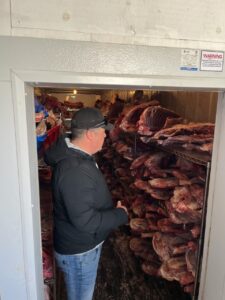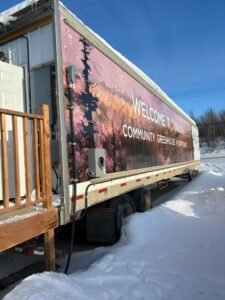FOOD
Food insecurity is a major problem across the territories.
According to a 2012 Canadian Community Health Survey, a staggering 17.1% of Yukoners and nearly 20% of Yukon children lived in food insecure households.
A Yukon News report from 2021 stated the Yukon currently has the third-highest rate of food insecurity in Canada; an ongoing problem placed in sharp relief by the pandemic. The Yukon only produces, being generous, about 10 per cent of the foodstuffs it needs to support the population, so we are really reliant on external shipping.
Statistics Canada claimed that, in 2022, 22% of people living in NWT are experiencing food insecurity. Among Northerners, Indigenous peoples are particularly at risk of being food insecure. Food insecurity has severe consequences on health and well-being; it has, for instance, been linked to malnutrition, infections, chronic diseases, obesity, distress, social exclusion, depression, and suicidal ideation.
According to the Nunavut Food Security Coalition, food insecurity is an urgent public health issue in Nunavut. Nearly 70% of Inuit homes in Nunavut are food insecure.
This household food insecurity rate is over eight times higher than the Canadian average, and one of the highest rates for an indigenous population in a developed country.
The Coalition discussed six themes that need to be addressed to ensure food security is achieved. While they were referring specifically to Nunavut, the problems in NWT and the Yukon are similar, so our strategy will be as well. We aim to actively work on five of these six themes to eliminate food insecurity as follows:
1. Country food. Their concern was local populations are eating less country food than in the past due to:
- Loss of traditional knowledge.
- High cost of harvesting equipment.
- Rapid population growth.
- Poverty that limits people’s ability to pursue traditional activities.
- Changing food preferences.
- Changing climate conditions that restrict access to harvesting areas and impact wildlife.

- Scarcity of wildlife due to population fluctuations.
We can help any community in need in this area by
- Assisting to examine sustainable commercialization of country food.
- Assisting in lowering the cost and increasing the reliability of shipping between communities.
- Providing local residents with more reliable and better equipment to fish and hunt.
- Working with communities to improve infrastructure such as places to store, prepare, share, and sell their harvests.
2. Store-bought food. Their concern was people eat more store-bought food than in the past and we must ensure they have healthy choices. To expand on their thought, a significant and growing concern in recent years is the pricing of goods in northern markets. In March 2025 we did a comparison of some basic goods between a northern market and a southern market:
ITEM NORTH SOUTH DIFFERENCE
Jelly 250ml $8.49 $2.43 249%
Ketchup 1L $13.69 $7.38 86%
Mayonnaise 1.8L $21.69 $16.51 31%
Pickles 1L $13.89 $5.46 154%
Applesauce 6x113g $6.89 $3.56 94%
Cereal 570g $13.29 $7.97 68%
Canned vegetables 398ml $5.79 $3.36 72%
Milk 1/2gallon $14.79 $4.27 246%
Mouthwash 1L $16.29 $7.13 129%
Toilet Paper 1936sheets $19.99 $7.55 165%
We will help in this area by working with manufacturers and shippers to improve lowering costs and shipping reliability. This will allow local stores to carry healthier choices in greater abundance at more affordable prices.
3. Local food production. They said that in 2013, the greenhouse in Iqaluit produced 48kg of produce for the community. Their goal is to expand greenhouse production throughout Nunavut.
We will help in this area by

Building community greenhouses in any community that requests one. We will work with Canadian manufacturers to acquire large enough greenhouses and/or hydroponics to feed the entire community. We will work with shippers to get the building materials to the community at charitable rates. We will work with each community to hire skilled trades for the construction and pay them to employ local residents as apprentices, teaching them how to build and maintain the greenhouses
Connecting local residents with existing northern greenhouses to learn how to grow, maintain, and harvest the plants chosen by the community.
Maintaining a life-long partnership with each greenhouse, repairing, upgrading, or expanding existing greenhouses, or by training new personnel as needed.
4. Life Skills. Their concern was that many of the youth are not learning the ways of old with sufficient expertise. They recommended building a network across Nunavut for the development and transition of skills, including content experts and educators.
We will help in this area by using our charity network to bring people together using our charity’s funds, employing elders to share their knowledge with youth across the territories as requested. We will respect the culture and traditions of all, with our role being simply to raise and provide funds and assist in making connections.
5. Programs and community initiative. They pointed out that community support programs such as school nutrition and food banks need to be enhanced and extended.
We will help in this area by
- Working with other charities and with shipping companies to make sure that goods can be delivered reliably to food banks.
- Using this enhanced shipping and community greenhouse efforts to enhance school nutrition.
- Food Banks Canada is working hard in this area. We will partner with them where needed to support improvements in this area.
The charity will obtain funds from private donations, foundations, sponsors, and through government grants. The projects will use donated or at-cost labour and materials. We will then turn the project over to the community at no cost.
Below is a link to the 2014 report and their website. Though ten years old, conditions have not improved significantly, which is a major reason why we are starting this charity.

